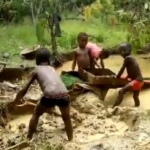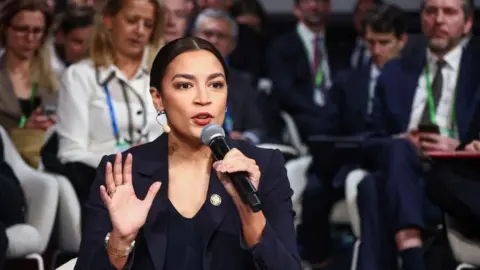
The streets of Accra echo a sentiment long buried beneath political rhetoric and empty promises. As protesters marched, their deliberate pace was a powerful and solemn statement. This was not a sprint for a quick headline; it was a march of reckoning, a physical manifestation of the snail’s pace at which our leaders have addressed a crisis that threatens our very survival. The #StopGalamseyNow banner isn’t a protest slogan; it’s a desperate cry from a people pushed to the brink.
The Political Rhetoric
The galamsey crisis has always been a tale of two Ghanas. One is the Ghana of the politician, a land of mineral exports and foreign revenue. The other is the Ghana of the market trader and the small-scale farmer. For millions of Ghanaians, the crisis isn’t an abstraction. It’s in the rising cost of cooking oil, the poisoned water they can’t drink, and the lost livelihoods they can’t recover.
The fierce condemnation from Professor Eric Abavare rings true. He says, “these two destructive parties have destroyed Ghana in a literal sense,” and the data backs him up. We are a nation where approximately 60% of our water bodies are polluted and our gold-rich land is riddled with deadly chemicals.
A protester’s accusation directly challenged the former administration. As he insisted, “In any serious jurisdiction, Nana Addo Dankwah Akufo-Addo should have been imprisoned by now.” He further lamented that “even $97 million (approximately ₵1.2 billion) meant for the Cathedral could have been used to build hospitals to treat galamsey-induced kidney problems.” This connects the dots between political priorities and human suffering.
The Crisis of Political Will
The political posturing from both major parties has often overshadowed concrete action. In a 2017 interview, former President Nana Akufo-Addo boldly declared, “I am putting my presidency on the line to fight galamsey.” Years later, the crisis worsened, leading many to question the sincerity and effectiveness of his pledge. Similarly, current President John Dramani Mahama, while addressing the issue in 2023, stated, “The fight against galamsey is not a matter of convenience but a matter of national survival.”
However, in a recent media engagement, he argued against declaring a state of emergency, saying it would not solve the problem and could instead lead to a “blood bath” given the widespread community involvement in illegal mining. This highlights a painful truth: a perceived lack of political will has become our national currency.
The fact that the Al Jazeera Gold Mafia exposé and Professor Frimpong-Boateng’s report have not led to a single high-profile prosecution is a testament to this deep-seated political rot. The system designed to protect us has, by its inaction, become our greatest enemy.
The Voice of the People
For ordinary Ghanaians, these crises aren’t abstract; they are personal. The Ghana Water Company Limited (GWCL) has raised the alarm that it now spends unusually high volumes of chemicals and is facing soaring operational costs, leading to a proposed 280% upward adjustment in water tariffs. From his home in a community along the Ankobra River, a fisherman named Kwame Osei-Bonsu lamented, “My father fished this river, and so did his father before him. Now, we are afraid to even drink from it. The river is dead, and our livelihood is gone. What is left for our children?” It’s a betrayal of the living and the dead.
The vigils and marches, attended by ordinary Ghanaians, are a direct rejection of this complacency. They are the new wave of civil disobedience, born from the pain of drinking poisoned water and seeing their future mined into oblivion. Their message is clear: they will not stop until the government takes decisive steps.
The Price of Survival
The analysis of this crisis is incomplete without understanding the economic desperation that drives it. While the government claims a focus on job creation, for many, galamsey provides a far more lucrative option than formal employment. With miners earning up to ₵2,000 per week, significantly higher than the average monthly salary for teachers, the financial lure is undeniable. For a young person in a village with few other prospects, this isn’t a choice of greed; it’s a choice for survival.
The Role of Foreign Actors
The issue is further complicated by the involvement of foreign nationals, particularly from China, who have introduced more sophisticated and environmentally destructive equipment, escalating the scale of the problem. This influx, often facilitated by corrupt officials and local power brokers, points to the deep entanglement of the galamsey crisis with international networks and political interests.
The True Cost of Galamsey
The devastating effects of illegal mining are evident on multiple fronts. The Wilson Center estimates that galamsey costs Ghana more than $2.3 billion (approximately ₵27.6 billion) each year in lost revenue and illegal smuggling. Over 100,000 acres of cocoa farms have been obliterated, impacting the cocoa industry, which accounts for nearly 10% of Ghana’s exports. Beyond the environmental and economic crises, the use of toxic chemicals has been linked to severe health issues, including kidney failure, cancer, and birth defects. This highlights the central dilemma: the government cannot simply arrest its way out of this problem. Any solution must acknowledge the fact that hundreds of thousands of Ghanaians rely on this activity for their livelihood. Their stories are not of villains, but of people trapped in a cycle of poverty, sacrificing their health and their land for a chance at a better life.
A Call for Political Courage
Dr. Sekou Nkrumah’s call for a “state of emergency” isn’t a radical plea; it is a desperate appeal for political will. He states that “the government doesn’t have the political will to say enough is enough to stop it.” As Professor Michael Ayamga-Adongo warns, a state of emergency could lead to a “blood bath” given the “widespread community involvement in illegal mining.”
This indictment of both the NDC and NPP is the core of the matter. It exposes a painful gap between political promises and concrete action. The citizens of a serious country like Kenya would have engaged in “civil disobedience right away.”
Government Response and Challenges
While the government has launched initiatives like the Ghana Gold Board (Goldbod) to centralize gold exports and a mining task force to raid hotspots, these efforts are seen by many as insufficient and lacking the political teeth to address the root causes of the problem. The government has also recently tightened visa requirements for Chinese nationals in an effort to curb their involvement in the illegal mining sector.
A National Reckoning
The fight against galamsey isn’t a political football; it is a national emergency. It’s about a nation losing its soul. The desecration of our land and water bodies is a betrayal of the living and the dead. As one woman in a community near the Birim River pleaded, “They have stolen our farmlands, our livelihoods, and even the future of our children. If our leaders do not act, who will protect us?”
The fact that the fight for our environment is met with political inertia is a stain on our collective character. It tests our faith in the rule of law and our ability to hold our own accountable. A culture of impunity has poisoned not just our lands, but the very essence of what it means to be a citizen of Ghana.
This new wave of protest isn’t just about a petition; it is about reclaiming our destiny. It is a moment of truth for President Mahama’s government to deliver on its promises and show the political will required to save Ghana. As citizens, we have a responsibility to hold our leaders accountable. Our future, as a nation and as a people, depends on it.

